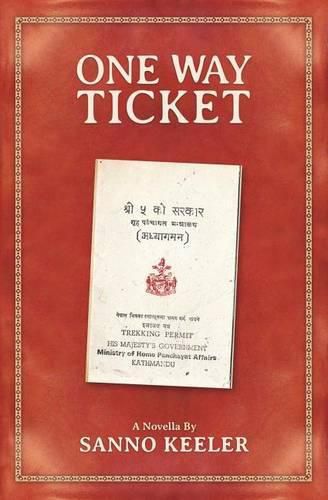Readings Newsletter
Become a Readings Member to make your shopping experience even easier.
Sign in or sign up for free!
You’re not far away from qualifying for FREE standard shipping within Australia
You’ve qualified for FREE standard shipping within Australia
The cart is loading…






This title is printed to order. This book may have been self-published. If so, we cannot guarantee the quality of the content. In the main most books will have gone through the editing process however some may not. We therefore suggest that you be aware of this before ordering this book. If in doubt check either the author or publisher’s details as we are unable to accept any returns unless they are faulty. Please contact us if you have any questions.
A Novella of Cross-Cultural Experience in Nepal Anthropologists occasionally turn to fiction to convey the deeper texture of their experiences. Sanno Keeler composed this novella for the same reason while still a student. One Way Ticket was written in 1969 but the story is suffused with an aura of timelessness. The author deftly portrays the quest to understand the unity-in-diversity of the human world. The narrative illuminates the joys, disappointments, and even tragedy that can accompany the circumstances of cross-cultural situations. One Way Ticket is a multi-level journey. In addition to memorably portraying landscapes, city streets, village settlements, and people, the author captures thoughts, feelings, perceptions, and nuances of relationship that are ordinarily illusive and often fleeting. There is a real freshness in the writing, but at the same time a kind of wistful and almost tragic aura - this not just a story about trekking to a remote village of an ancient culture. At one point, the narrator concludes that for her consciousness is above innocence. Within this comment, the story develops an undertow that heads for deep water and a dramatic twist. Sanno Keeler was the first graduate of the global education program of Friends World College (1970). She did graduate study at Indiana University and became a teacher of migrant worker’s children in California.
$9.00 standard shipping within Australia
FREE standard shipping within Australia for orders over $100.00
Express & International shipping calculated at checkout
This title is printed to order. This book may have been self-published. If so, we cannot guarantee the quality of the content. In the main most books will have gone through the editing process however some may not. We therefore suggest that you be aware of this before ordering this book. If in doubt check either the author or publisher’s details as we are unable to accept any returns unless they are faulty. Please contact us if you have any questions.
A Novella of Cross-Cultural Experience in Nepal Anthropologists occasionally turn to fiction to convey the deeper texture of their experiences. Sanno Keeler composed this novella for the same reason while still a student. One Way Ticket was written in 1969 but the story is suffused with an aura of timelessness. The author deftly portrays the quest to understand the unity-in-diversity of the human world. The narrative illuminates the joys, disappointments, and even tragedy that can accompany the circumstances of cross-cultural situations. One Way Ticket is a multi-level journey. In addition to memorably portraying landscapes, city streets, village settlements, and people, the author captures thoughts, feelings, perceptions, and nuances of relationship that are ordinarily illusive and often fleeting. There is a real freshness in the writing, but at the same time a kind of wistful and almost tragic aura - this not just a story about trekking to a remote village of an ancient culture. At one point, the narrator concludes that for her consciousness is above innocence. Within this comment, the story develops an undertow that heads for deep water and a dramatic twist. Sanno Keeler was the first graduate of the global education program of Friends World College (1970). She did graduate study at Indiana University and became a teacher of migrant worker’s children in California.